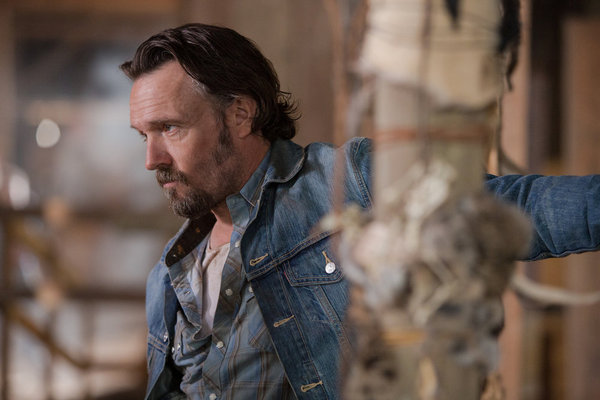
Friday’s films at Tribeca 2015 is a fine example of why this year’s festival lineup is so strong. There are some years where Tribeca features quite a few movies that prove the adage “‘Independent’ does not necessarily mean ‘good,’” but this year is not one of them. Although one of the movies below stands above the others, any of them would a high-quality find for your average arthouse theater.
The film that stands above is Sworn Virgin, nominally an Italian film which received financing from all over Europe in order to get made. It’s the story of Hana (Alba Rohrwacher), an Albanian woman from a picturesque mountain village who is forced to live as a man in accordance with local traditions. The death of her parents causes her to move to Italy, where the big-city life challenges her to look at her identity in a new way. (Apologies to transgendered readers for the use of “she” and “her” in this situation, but the dramatic tension in this movie comes from the fact that not even Hana knows what pronoun should be correct to describe herself.) Every single scene in this film is pregnant with metaphor, bombarding Hana with questions about sexuality and identity that were never before considered. The use of synchronized swimming is especially inspired, showing how easily Hana’s niece can put herself in lockstep with others while sublimating her actual personhood. All of this hidden meaning is tied together in a conclusion that carries uncommon emotional power… Grade: A
The three subjects of Toto and His Sisters are children living in a Romanian slum, and the imprisonment of their mother on drug charges has turned their apartment into a heroin den. This leads to some gut-wrenching moments, such as six-year-old Toto playing with a dirty needle on his couch while a nearby junkie shoots up into his neck, that might call into question why the camera was allowed to run and what are the responsibilities of documentarians to take action in the face of child endangerment. But director Alexander Nanau is not only interested in squalor, and also captures the kids’ attempts to claw their way into better things, such as Toto’s obsession with hip-hop dancing. Documentaries about children are the hardest in the genre to make, since children naturally feel self-conscious and want to perform for the camera in a way that should never happen in a document of actual events. Thus, Nanau does a remarkable job of making the camera invisible — the crew casts no shadows even in natural light, and are not seen even in background mirror reflections. The movie closes with a question that should seem impossible for a person to ask in front of a camera crew, and an answer that would be equally impossible to deliver. It’s a victory for Nanau, and for all documentaries, that they were able to capture it on film… Grade: A-
The title character in King Jack lives in a small town with nothing going on, his single-parent mother struggling to make ends meet. There have been several indie films in recent years covering that same ground, so you would be forgiven for expecting Jack to end up using drugs, dealing drugs, or watching his friends do the same, as happens in those other stories. But writer/director Felix Thompson goes a different way: Jack (Charlie Plummer) is simply unpopular. He struggles with bullying from some older kids down the street, he gets in trouble for his juvenile-delinquent style of retaliation, and his strained family situation means he has no one to stand up for him. With both script and direction, Thompson has an uncanny understanding of what it means to be Jack’s age: that in-between space where a boy thinks he’s old enough to drink, smoke, and make out with girls, but he’s still too immature to have any real responsibility. That understanding of responsibility is what this movie is building toward, and while nothing in the plot is revolutionary storytelling, it’s sincere and real, anchored by a terrific performance from Plummer… Grade: B+
The story behind the making of Bridgend may well prove to be more riveting than the film itself. Bridgend is an actual place, a country in Wales where 79 teenagers have committed suicide since 2007 without leaving suicide notes. Moreover, director Jeppe Ronde actually shot his film about those suicides entirely in and around Bridgend. But the story itself and the characters are all fictional: a teenage daughter of a police inspector becomes affected by the local students’ strange reactions to the suicides. The problem with this film is that it wants to have every possible flavor of cake with this plot, and eat them all too. Some scenes suggest that there is a criminal conspiracy afoot, some imply that the problem is something in the water, and some imply that teenage rebellion simply mutated out of control when mixed with the depression that accompanies a friend’s suicide. Since the actual suicides in Bridgend have never been explained, Ronde is unable to take decisive action with any of those plot threads, and it’s frustrating — the film spends a large amount of time lingering over an internet chat used by the kids, investing it with importance that the film’s climax can not deliver upon. Having said all that, there’s something about the horror of suicide that lends itself well to this sort of treatment. Even in cases where notes are left behind and self-negation does not seem to be infectious, there is always a lingering suspicion that we’ll never be able to truly know why, and Ronde ably delivers that message whenever all else fails… Grade: B+
Coming tomorrow: The rabbit and the wolf
-Mark Young



